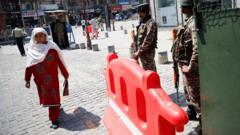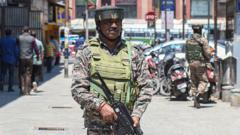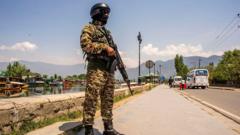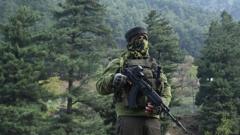With historical context, this article explores past events that might shape the current diplomatic landscape and potential resolutions.
India-Pakistan Tensions Escalate: Lessons from Historical Crises
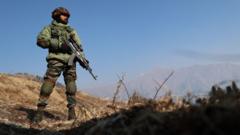
India-Pakistan Tensions Escalate: Lessons from Historical Crises
Recent deadly attacks in Kashmir ignite fears of escalating conflict between India and Pakistan, drawing parallels to past crises.
In the wake of last week's tragic militant attack in Pahalgam, Kashmir, which ended the lives of 26 civilians, the delicate relationship between India and Pakistan has once again been thrust into turmoil. This incident echoes previous crises that have marked the history of conflict between the two nuclear-armed nations. Notably, the military encounters following the 2016 Uri attack, which led to India's "surgical strikes," and the escalated tensions post-2019's Pulwama bombing, are reminiscent of the current situation.
Historically, each escalation has been tied to accusations against Pakistan’s support for militant groups, a claim that Islamabad vehemently denies. According to Ajay Bisaria, India’s former high commissioner to Pakistan, the attack in Pahalgam represents a significant turning point; it is not just a strike against security forces but against civilians, prompting memories of the devastating Mumbai terror attacks of 2008. "This incident resonates more with the Mumbai attacks than recent military strikes," Bisaria noted, indicating the potential for a more profound escalation as civilians rather than soldiers become targets.
In recent developments, India has swiftly retaliated, implementing a series of measures including closing key border crossings, suspending water-sharing treaties, expelling diplomats, and significantly limiting visa access for Pakistani citizens. These actions reflect a pattern of escalatory responses that have become habitual following attacks. Simultaneously, Pakistan has taken reciprocal measures, such as suspending its own visa processes and withdrawing from peace treaties, further impacting relations.
The ongoing tensions from the Pahalgam attack see both nations engaging in a familiar cycle of aggression and restraint, as emphasized by Bisaria's reflections on past diplomatic efforts post-Pulwama, which included trade suspensions and heightened military operations. Despite these tensions, crucial communication channels between military leaders remain open, signifying a glimmer of hope for de-escalation.
Yet, while the international community watches closely, and diplomatic discussions are pursued, the specter of military conflict looms large. With both countries weighing the costs of escalation, including serious long-term implications for both economies and security, it will be critical to observe whether de-escalation strategies can triumph amid rapidly intensifying cycles of violence and retaliation.
Historically, each escalation has been tied to accusations against Pakistan’s support for militant groups, a claim that Islamabad vehemently denies. According to Ajay Bisaria, India’s former high commissioner to Pakistan, the attack in Pahalgam represents a significant turning point; it is not just a strike against security forces but against civilians, prompting memories of the devastating Mumbai terror attacks of 2008. "This incident resonates more with the Mumbai attacks than recent military strikes," Bisaria noted, indicating the potential for a more profound escalation as civilians rather than soldiers become targets.
In recent developments, India has swiftly retaliated, implementing a series of measures including closing key border crossings, suspending water-sharing treaties, expelling diplomats, and significantly limiting visa access for Pakistani citizens. These actions reflect a pattern of escalatory responses that have become habitual following attacks. Simultaneously, Pakistan has taken reciprocal measures, such as suspending its own visa processes and withdrawing from peace treaties, further impacting relations.
The ongoing tensions from the Pahalgam attack see both nations engaging in a familiar cycle of aggression and restraint, as emphasized by Bisaria's reflections on past diplomatic efforts post-Pulwama, which included trade suspensions and heightened military operations. Despite these tensions, crucial communication channels between military leaders remain open, signifying a glimmer of hope for de-escalation.
Yet, while the international community watches closely, and diplomatic discussions are pursued, the specter of military conflict looms large. With both countries weighing the costs of escalation, including serious long-term implications for both economies and security, it will be critical to observe whether de-escalation strategies can triumph amid rapidly intensifying cycles of violence and retaliation.








